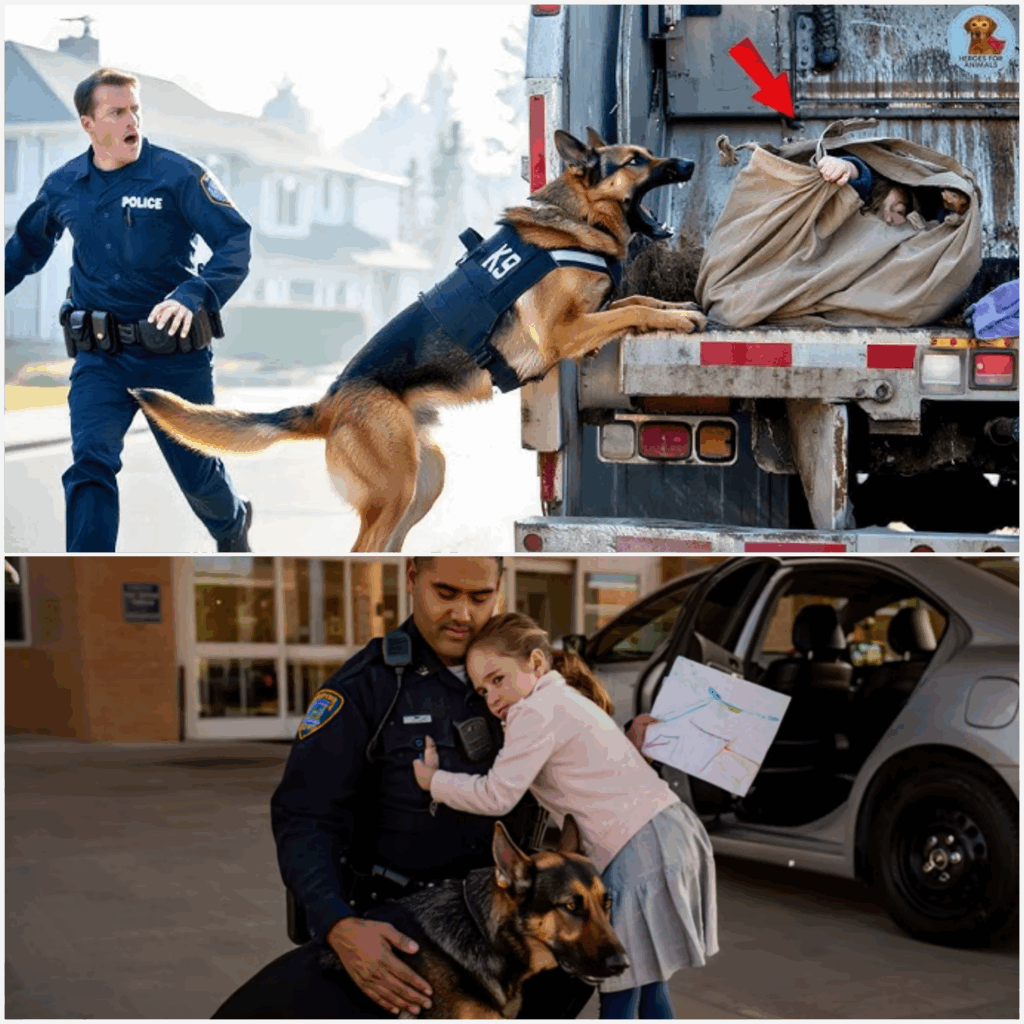The Night Rex Saved a Girl: A K9’s Heroic Discovery and the Fight Against a Hidden Nightmare
No one noticed the bag at first. Not the sanitation worker lifting can after can. Not the neighbor sipping coffee behind double-pane windows. Not the jogger who paused at the corner to tie her shoe. But Rex noticed. The German Shepherd, all muscle and instinct in a sleek black canine vest, locked eyes on the back of the garbage truck as it groaned to life. He didn’t bark—not yet. He just stared, tensed, then bolted.
Officer Mark Brener barely had time to say his name. “Rex!” Too late. The dog launched forward like a missile, clearing the sidewalk in a single bound and sprinting full speed toward the beeping metal beast pulling away from the curb. It wasn’t a chase bark or a call for attention—it was a warning that sent chills down Mark’s spine.
“Hold up!” Mark shouted, waving frantically as he ran toward the truck. The sanitation worker didn’t hear. The crushing compactor was starting. Rex barked louder, wilder, leaping at the back steps of the truck. Claws scraped metal, teeth bared at a stained, lumpy canvas sack jammed between bags of waste. Mark drew his sidearm—not to shoot, but to demand attention.
The worker finally saw him and slammed the emergency stop. Everything froze. The truck hissed and clunked. A cloud of hot diesel and day-old garbage hung in the air. But Rex didn’t stop barking. He stood now on the tail of the truck, front paws tearing at the filthy bag like his life depended on it—or someone else’s.
Mark climbed up, hammering his way through the rain and grime. He sliced the bag open with his knife and then stopped breathing. Inside that bag, curled like a discarded doll, was a child—a little girl, no shoes, no jacket, wrapped in a torn blanket, face pale, lips cracked, hands clenched in fists the size of quarters. She wasn’t moving.
“Call it in now!” Mark roared, scooping the girl into his arms and leaping off the truck with Rex close behind.
Siren screamed less than two minutes later. The ER staff moved fast, like a NASCAR pit crew for trauma. They had to. The girl’s core temperature was dropping. Her oxygen levels were borderline. She had bruises that didn’t match the garbage. Rope marks, old scrapes. Someone had put her there deliberately.
By afternoon, she was stable but unconscious. No ID. No one came looking. They started calling her Jane Doe number 94. Mark didn’t like that. He sat beside her hospital bed longer than his shift allowed. Rex parked dutifully at the door like a soldier guarding a secret.

The girl was maybe six or seven years old. Blonde curls matted with dirt, fingernails chipped, one sock on, the other missing. Who puts a kid in a trash bag? Who leaves her to die in a truck compactor?
Rex hadn’t just saved her life. He’d interrupted someone’s plan.
The next morning, a nurse gave her crayons. The girl didn’t speak, didn’t make a sound, but she drew. Not a house, not a family, not a rainbow. She drew a dog. A big dog with sharp ears, big paws, a black vest with three bold letters on the side: K9. Then she smiled—not at the drawing, but at the door.
Rex stood there, tail swaying slowly, ears high. The little girl got out of bed, barefoot, ivy dangling, and hugged him. Mark stood frozen. Not even a word had been exchanged. But that dog, his dog, had become her anchor, her lifeline.
The press ran the story: “K9 Dog Saves Girl from Garbage Truck Death.” It blew up. News vans camped outside the hospital. The department turned it into a PR moment—medals, interviews, donations. But Mark wasn’t buying the headline.
Something wasn’t right.
She hadn’t been lost. She hadn’t wandered off. There were signs of restraint, intent, placement. And the way Rex had reacted—that wasn’t just smell. That was recognition, memory. Had he smelled her before? On someone else, on some other case?
Mark started combing through files. Jane Doe cases, Amber Alerts, foster system transfers. He cross-checked every missing child in a 100-mile radius. Nothing matched except one: a case from 16 months ago. A girl placed in temporary custody under a different name, then shuffled between homes. No photos, only a vague description. The system marked her as relocated. No further action, no recheck.
Her name in that file: Emily T. Her age: seven. Her last location: a group foster home three towns over.
Mark made a call. The home was shut down now. The owner moved out of state. No forwarding address. But there had been complaints—three, one about neglect, one about physical punishment, one anonymous tip that was never followed up. Kids come in; they don’t always come out.
That night, the girl opened her eyes. She looked at Rex, still resting at the foot of her bed. Then she looked at Mark and whispered one word—not thank you, not mommy, just “safe.”
Mark didn’t sleep that night. Even after wrapping up the paperwork, after the hospital cleared him to go, after the scene replayed in every news segment from Boston to Bakersfield, he couldn’t shake what the girl had whispered before slipping back into sleep.
“Safe.”
Not “Where’s mommy?” Not “Help me.” Just one word. Short, final, like someone who’d been through the worst and finally barely believed it might be over. But was it?
Mark had been a cop for 14 years, and in that time, he’d seen his fair share of awful. But this—this felt personal. Maybe because it involved a child. Maybe because Rex had risked his own life to save her. Or maybe because something about the whole thing didn’t make sense.
If she’d been thrown away like trash, left to die, then who put her there—and why?
The next morning, Mark showed up at the hospital before sunrise. Coffee in one hand, Rex’s leash in the other. He wasn’t on duty. He didn’t care.
“Thought you might come back,” said the nurse on the fourth floor with a soft smile. She’d been waiting.
The girl was awake this time, sitting upright in the hospital bed, coloring quietly. No machines, no oxygen tubes, just a small band-aid on her hand and dark circles under her eyes that shouldn’t exist on a child that young.
When she saw Rex, her whole body lit up—not in a loud, bouncing kind of way, but in that quiet, sacred way only a child who has been terrified can show. Like he was the only thing in the world that felt right.
Mark stepped in slowly. “Hey there,” he said, crouching beside the bed. “Remember me?”
She nodded.
Mark noticed the page in front of her. Another drawing. This time it wasn’t just Rex. It was a hallway. Four doors, a hand, and a bag.
He felt his throat tighten.
“What’s your name, sweetheart?” he asked.
She paused, then reached for a red crayon and carefully wrote five shaky letters at the bottom of the page: “Ibme.”
That name didn’t appear in any of the police databases Mark had access to. Not under missing children, foster placements, CPS watch lists, or school withdrawals. But it had shown up once before, buried in the footnotes of a child welfare review from two years back: Emma TH5, no last name, placed under temporary care after a family emergency. The report didn’t say what the emergency was. It didn’t say where she was placed, and there were no follow-ups.
Convenient, Mark muttered to himself later that day, seated at his desk surrounded by files, printouts, and a whiteboard that was quickly becoming a crime map. The system was supposed to track every child who entered state care, but someone had scrubbed this one clean—or maybe never filed it properly to begin with.
He highlighted Emma’s name and circled it in red. Rex gave a low whine from under the desk.
“I know, buddy,” Mark said. “We’re not done.”
That afternoon, Mark returned to the hospital with something different—a stack of photos. Not of people, not yet. Of dogs, K9 units from across the state, past and present.
He wanted to see how far Emma’s memory reached, if she had met Rex before, or a dog like him.
Emma flipped through the photos carefully. When she reached a picture of Rex taken a year ago, his tongue out, ears perked, she stopped. Then she turned the page and pointed.
“That one,” she whispered.
Mark leaned in. It was Rex. But not the Rex. A different photo.
“Rex is a puppy from his training days. Shorter ears, smaller paws.”
“That’s my dog,” Mark said. “You remember him?”
Emma nodded slowly. “He was there.”
Mark’s heart nearly stopped.
“Where’s there?”
But she went quiet again—not from fear, but like she was protecting something or someone.
Mark drove back to the station and started digging into Rex’s deployment records. There was one assignment that stood out—a temporary visit just over a year ago to assist a neighboring county during a raid on an unlicensed group home.
The case had been closed quickly. No arrests, just a shutdown. Building code violations, one child placed elsewhere. No one followed up.
Emma would have been five then. Small, forgettable, easy to lose in paperwork or easy to hide.
Mark stared at the report for hours. He scribbled down the name of the home: Cedar Pines Youth Center. The address was about 90 minutes outside of town.
Closed. Condemned. No access granted without a warrant, so he didn’t ask for one.
It was near dusk when Mark pulled into the overgrown driveway of the abandoned facility. Rex barked once, then quieted.
The place had the bones of something that used to look like help—an old red brick building with a white porch now sagging with rot. Plastic toys sat in the weeds like forgotten memories.
He stepped out of the cruiser, hand resting on his sidearm, Rex at his side.
The windows were boarded, the fence was bent, and spray-painted on the front door were three words: “Keep out, freaks.”
He ignored it.
Inside, the air was musty, thick with mold and thyme. The walls were peeling, dust coated everything like frost.
Rex’s nose twitched. He moved toward the back hallway, past what looked like an old cafeteria and a cracked tiled floor. He stopped, scratched at the wall.
Mark leaned in.
Behind a sagging sheet of drywall was a narrow crawl space.
He took out his flashlight and shone it in.
On the wall, written in faded crayon and pencil, were names. Dozens of them and at the bottom, barely visible: “Emma, age six, be brave.”
Mark felt a wave of nausea rise in his gut.
This wasn’t just an abandoned foster home. This was a place where children were kept, hidden, discarded.
He drove straight back to the hospital.
When Emma saw him, she reached for her crayon again. This time, she drew something different—a truck, a bag, a man.
The man had a tattoo on his wrist. Three dots in a triangle.
Tears welled in her eyes, but she kept drawing.
Mark realized what this was.
She wasn’t just remembering the rescue. She was telling him who put her in the bag.
There was a man listed as a former employee of Cedar Pines. Low-level staff, no formal complaints, but he had a criminal record—possession, petty theft, and more recently, he’d been arrested for illegal dumping.
He worked waste management, one of the garbage truck drivers, the same route Rex had jumped onto.
Mark stood outside the hospital that night, Rex by his side, staring at the quiet sky over the city.
There was a storm coming, and Emma wasn’t the only child they had to find.
He looked down at Rex and whispered, “You ready for round two, partner?”
Rex gave a soft bark, and they both turned toward the lights of the station.
“Ready to dig deeper.”
.
play video:

